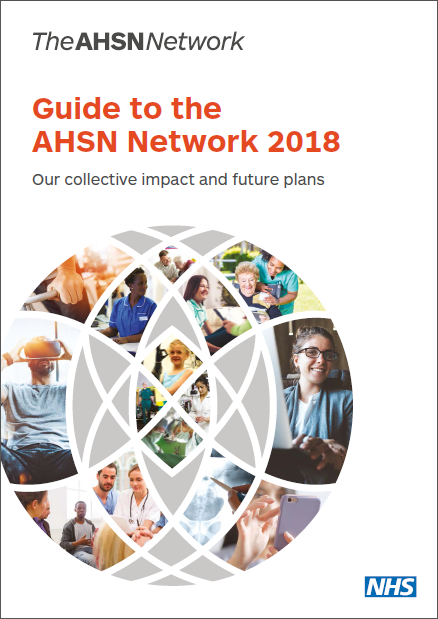Spotlight on the AHSN Network’s collective impact and future plans

A new guide to the AHSN Network is published today, detailing the impact to date of England’s 15 Academic Health Science Networks (AHSNs), as well as outlining future plans for the years ahead.
The AHSNs were first licensed by NHS England in 2013 for an initial period of five years, and in that time they have pioneered new ways to spread and adopt healthcare innovation.
At its board meeting in May, NHS England formally approved a new five-year licence for the AHSNs, as part of its 10-year vision to drive health innovation and stimulate economic growth.
The report highlights the collective achievements of the AHSNs so far, which include:
- Over 22 million patients benefited from AHSN input
- Over £330 million leveraged by AHSNs to improve health and support NHS, care and industry partners
- Over 330 innovations introduced through AHSN influence
- Over 500 jobs created
- Hundreds of commercial innovators supported
- Over 11,000 locations developing innovations supported by AHSNs.
On top of this, 1,242 NHS sites are now using solutions developed by Fellows of the NHS Innovation Accelerator, the NHS England initiative delivered in partnership with the AHSNs.
Over 150 companies have been supported by our innovation development programme, SBRI Healthcare – delivering over £19 million annual recurring savings to health and care.
And through the work of the 15 Patient Safety Collaboratives hosted by AHSNs in partnership with NHS Improvement, there has been a 67% reduction in acute kidney injury (AKI) mortality, while sepsis mortality has reduced by 24%.
The report also features case studies on seven of the AHSNs’ programmes, which have been identified for national adoption and spread across Network in 2018-20. These are:
- Atrial Fibrillation (AF): sharing learning and spreading best practice from across the 15 AHSNs to reduce AF-related strokes.
- Emergency Laparotomy: a collaborative approach to improving standards of care for patients undergoing emergency laparotomy surgery.
- ESCAPE-pain: a group rehabilitation programme for people with knee and/or hip osteoarthritis, providing self-management support in the community.
- PINCER: supporting pharmacists and GPs to identify patients at risk from their medications and taking the right action.
- PReCePT: working with maternity units to use magnesium sulphate to prevent cerebral palsy in preterm labour.
- Serenity Integrated Mentoring: bringing together police and healthcare professionals to make a positive difference to the lives of people with complex mental health needs.
- Transfers of Care Around Medicine: help for patients who need extra support taking prescribed medicines when they leave hospital.
In addition to the work with NHS England and NHS Improvement, the government’s Office for Life Sciences is also funding AHSNs to coordinate a network of Innovation Exchanges across England, building on AHSNs’ unique expertise and cross-sector connections to match health needs with potential solutions.
Professor Mike Hannay, Chair of the AHSN Network, said: “It’s been quite a journey since the 15 AHSNs were first established back in 2013. While there have been challenges and obstacles along the way, AHSNs have rapidly become a vital part of the country’s health economy, connecting and brokering partnerships between health and care, academia, the third sector and industry.
“With what seems like a current explosion of innovation and new technologies, the role of the AHSNs isn’t simply to support the NHS in identifying those in which to invest, but also in helping to build health and care ecosystems, with cultures, leadership and pathways ready to accept and work with these new solutions.
“In our new licence from NHS England, the 15 AHSNs will develop this role as the key innovation arm of the NHS; supporting our health and care partners to deliver improvements that lead to better patient outcomes, drive down the cost of care and stimulate economic growth.”
To find out more about the healthcare solutions developed and spread with support from the AHSNs, visit the AHSN Atlas, many of which have been showcased in our ongoing NHS 70 Innovations campaign in partnership with NHS Digital.